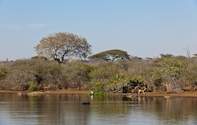
Wilderness is not an easy concept to define. Although the Americans are credited with the beginning of the wilderness notion as we know it today, researchers like Jane Carruthers and M Draper believe that in South Africa, James Stevenson-Hamilton does not get enough recognition for his wilderness philosophy and wilderness approach to management during his time.
This is evident, they claim, in observations like these."Few," said Stevenson-Hamilton, "however, can sojourn long within the unspoiled wilderness of a game sanctuary, surrounded on all sides by its animals without absorbing some of its atmosphere; the Spirit of the Wild is quick to assert her supremacy, and no man of any sensibility can resist her."
Another observation in his book, South African Eden, about his campaign to reduce the lion population in the Sabi Game Reserve, is mentioned, "I have always felt that Nature is able to manage her affairs better than Man can do for her, and, when possible, have worked on that conception. It may have been a mistake to try to keep down the carnivorous animals in the days of the Sabi Game Reserve, but it was a policy forced onto us by circumstances."
It is generally accepted, however, that wilderness conservation in southern Africa started with pioneers like Ian Player, Magqubu Ntombela and Jim Freely in the Imfolozi Game Reserve at the Natal Parks Board in the 1950s. Bill Bainbridge was instrumental in the first legal protection for wilderness through the amendment of the state forest act in the 1970s. "This allowed for statutory protection of wilderness within some of our national forests," states Wouter Jordaan in Kruger's wilderness management plan (WMP).
But what is wilderness? Most experts agree that the wilderness has two dimensions. The first is a physical place in an area that has been proclaimed by law, often in a protected area. The second is a state of mind that often translates in a person's spiritual or personal experience of the place. This is also frequently described as "sense of place" or "wilderness being what people think it is".
South Africa recently adopted a formal definition of wilderness in protected areas in the National Environmental Management Act: Protected Areas Act (No 57 of 2003) (NEMPAA) as: "an area designated (in terms of section 22 or 26) for the purpose of retaining an intrinsically wild appearance and character or capable of being restored to such and which is undeveloped and roadless, without permanent improvements or human habitation."
Last year the Kruger National Park (KNP) adopted the WMP, which was developed to provide a framework for the future management of wilderness within Kruger. The WMP will be incorporated into the Kruger park management plan. According to the plan "apart from identifying areas in the KNP to be declared statutory wilderness, the WMP aims to highlight the wilderness management principles and objectives that will apply and how this will inform the decision making environment affecting conservation management, visitor management, scientific research and monitoring within such areas."
In terms of the requirements of NEMPAA and the management plan, Kruger developed a zoning plan that is in accordance with the SANParks conservation development framework.Within this framework, the concept of wilderness management adopted by the park is to manage human influences so that the natural conditions of wilderness ecosystems are not altered beyond agreed-upon standards. "The manager should use only the minimum tool, force and regulation necessary to meet the desired objective."
One of the management objectives is to promote understanding, acceptance and support of the wilderness philosophy amongst park visitors, staff and neighbouring communities and foster custodianship towards the future protection of wilderness in the park.In February 2008 the conservation services department hosted a workshop to develop a South African Quality Assurance (SAQA) accredited wilderness training course.The five-day training course was facilitated by the Wilderness Action Group, a section 21 company comprising a group of renowned conservationists.
"We hope to have a final training module for wilderness where we can drive the programme within KNP," says Andrew Desmet, park activities manager in Kruger.Andrew says the training programme will cater for stakeholders at three levels - a basic orientation programme, a more in-depth programme for trails rangers, section rangers and perhaps scientific services staff and a dedicated training programme for trails ranger staff to facilitate a wilderness experience to Kruger visitors.

 Join a 3-Day Kruger Wild Explorer Safari to uncover untouched beauty in Kruger National Park. Book your exploration now!...
Join a 3-Day Kruger Wild Explorer Safari to uncover untouched beauty in Kruger National Park. Book your exploration now!...